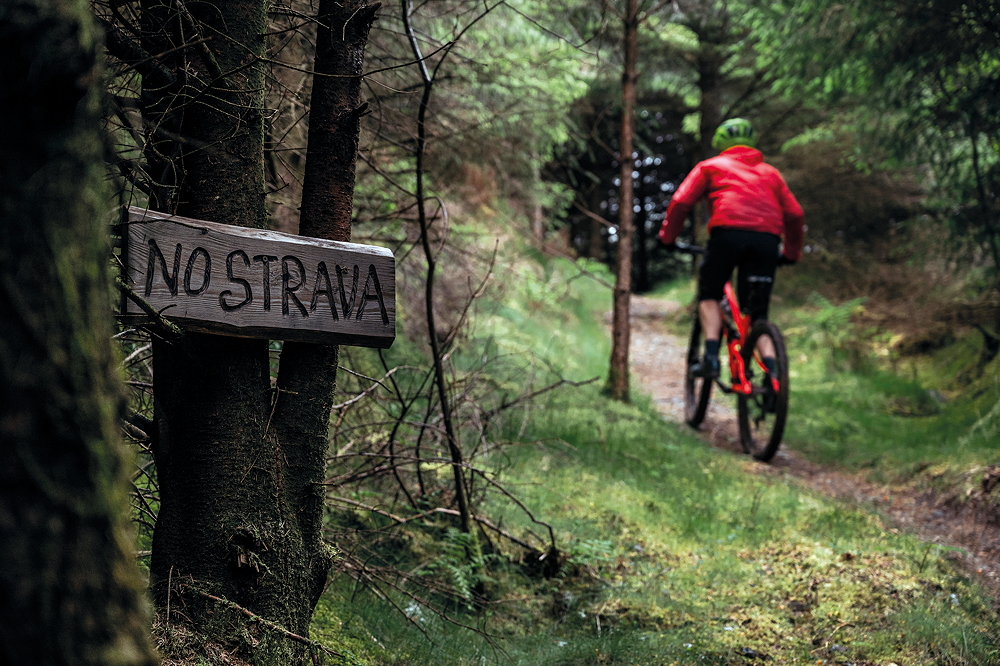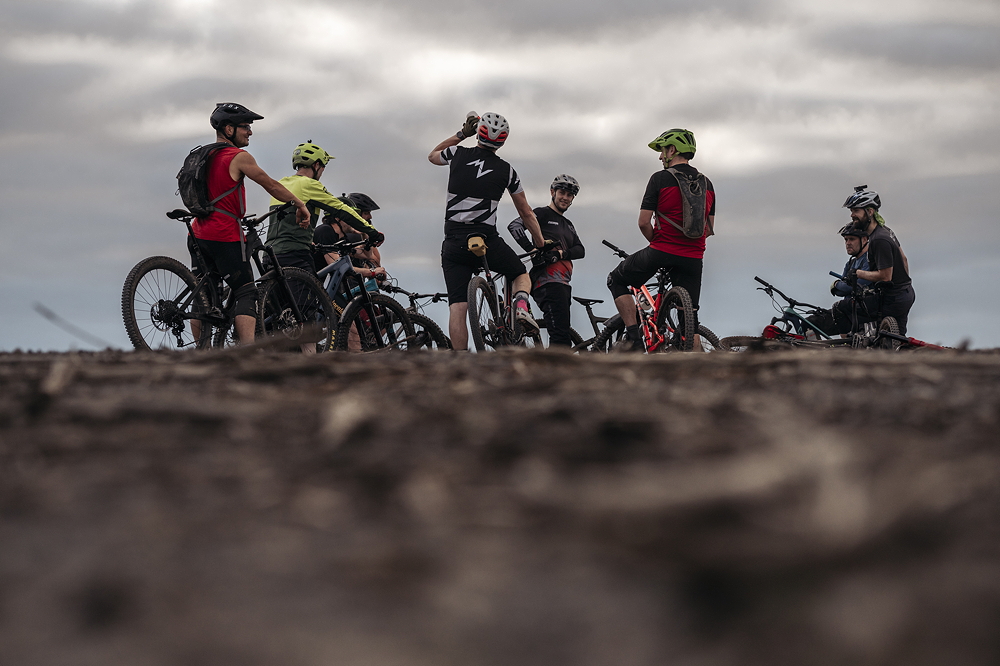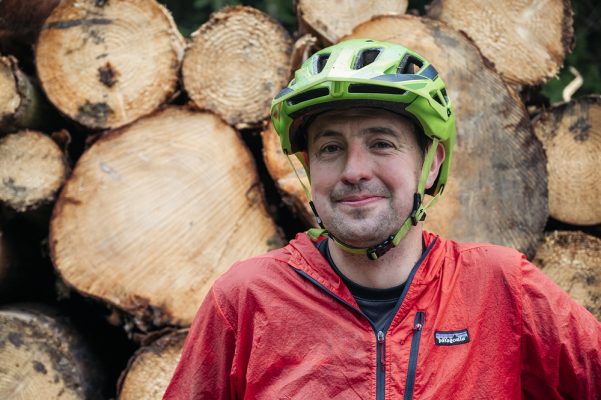Thanks to Dave Evans’s tireless advocacy, Wales’s rich network of trails is in rude health and the future looks even brighter.
Dave Evans jokingly describes himself as the most boring man in mountain biking. Even a brief chat with him would reveal that this is patently untrue, and is more of an acknowledgement that his ability to deal with bureaucratic processes and a familiarity with operating a clipboard have given him a unique range of skills and perspectives within mountain biking.
Based in the Dyfi valley that divides north and mid-Wales, Dave’s company, Bike Corris, offers trail consultancy and mountain bike development services along with guiding and accomodation. With a broad spread of talents, his work is varied and far-ranging, but his latest work for Natural Resources Wales (NRW) is possibly some of the most interesting, with the potential to make hundreds of rider-built trails in Wales official. The most boring man in mountain biking? Hardly.
Want some natural riding routes in Wales? Read our 100 Best Mountain Bike Routes in the UK listing.

Dave dropping in to say hello
Wild trails, that is trails built without the land owners’ permission, have existed as long as bikes have been ridden off-road. In the last couple of years the number of these trails has grown rapidly, with the primary reason being convenience. Riders want trails that are accessible from their doorstep without having to put their bike in a car and travel. The last year has only reinforced the desire – and necessity – for local trails. With a low population density, good topography and plenty of quiet forests, it’s not surprising that Welsh riders have been building almost as much as they have been riding.
Some of the wild trails in the Dyfi Valley go back a generation, with sons and daughters now riding trails their parents built. These are the trails that have given the valley its reputation and legacy, providing the foundation for what followed – the Climachx trails, Dyfi Enduro and eventually Dyfi Bike Park.

Dave’s trail advocacy skills means he can always see the wood for the trees
The constant fear has been that, while they may be well-established trails, being built on Natural Resources Wales (NRW) land, they exist on borrowed time – at some point machines will move in to harvest the tree crop with little regard for the trails that weave between them. Back in the day you might have been able to buy the head forester a pint at the rugby club and ask if he could mind the trails. Now, contractors from around the country are brought in to handle felling and everything is run by GPS. If it’s not on the official GPS map, then as far as the contractor is concerned it doesn’t exist. Dave explains: “The only way to protect the trails is to get them enshrined in the sweltering process of bureaucracy.” Luckily Dave has plenty of experience dealing with that, the only issue is it requires riders revealing the location of the trails to NRW.
Trail builders and land owners typically play a game of cat and mouse, but as Dave points out, if you think the local forest ranger doesn’t already know about your trail you’re deluded – and try putting ‘secret’ into Strava. When it comes to keeping trails low-key, mountain bikers are their own worst enemy.

Riders want accessible trails from their doorstep
Pre-Covid, Dyfi gained a new NRW area manager. With a background in leisure, she saw the forests as not just a crop, but as assets to the communities who live and work alongside them, and was eager to engage with the riding community. Plans were drawn up to add three of the established trails in the area to the NRW official map, giving them a similar status to footpaths and safeguarding them come harvest time. These trails would then be rider-managed and officially sanctioned. This was a big deal.
NRW then decided it didn’t want to do things piecemeal from area to area; if this was going to happen it wanted it to be done across Wales. At first Dave felt dejected. Knowing how ponderous large organisations can be, he thought its plan was effectively dead in the water. The upside to this decision, of course, was the potential for wild trails across Wales to become permanent features.

Keeping trails under the radar is not easy in the digital age
Trail survey
In truth, the number of wild trails appearing on the ground, and then on YouTube and Strava, hadn’t gone unnoticed at NRW and it simply couldn’t ignore what was happening on its land. There was also wider politics at play. The Well-being of Future Generations Act and State of Natural Resources Report (SoNaRR) both make recommendations that encourage the use of the outdoors for Wales’ physical, mental and economic well-being. The stars seemed to be aligning.
Thanks to his work in Dyfi, in 2019 NRW commissioned Dave to map and assign grades to all the off-piste trails on its property in north and mid-Wales. The data Dave gathered would help it build a better picture, not just of the number of trails, but also the needs of mountain bikers.

Wales is blessed with a wealth of great trails and making them official will keep it that way
After handing over his findings to NRW, Dave felt compelled to write about some of his observations, which he published on his website.
The white paper, written for the benefit of landowners, aims to explain who is building on their land, what they are doing and why. The paper makes for interesting reading from a rider’s perspective too, and lays out ideas for how land owners and mountain bikers can work together. One point that stands out from the paper is that, while Dave had been sent to look for trails, what he’d found were communities.

Decent local trails and strong mountain biking communities go hand in hand
During his travels collecting trail data, Dave found each trail network had its own community who were proud of their work. Rather than shying away, they were keen to engage and eager to explain the importance of their trails. Reasons included not having to rely on a car to go riding, having a variety of places to ride, mental health, personal investment, scope to push their riding and more.
Community action
Wales is of course synonymous with trail centres, but there’s a shift from a situation where resources are provided to the mountain bike community by NRW, to one where the community wants to feel some kind of ownership. People will still want to visit the trail centres and bike parks, but that will be a weekend trip – the desire is for the weekday, post-work ride to be possible from the door on trails managed and maintained by local riders.

Whether it’s red trails or red tape, Dave’s got the focus and drive to chart a steady course
It’s not just riders who want to have a stake in the trails. Surrounding the trails are very engaged local communities who are keen to be involved. Dave says that dig days attract more than just dedicated riders; from parents looking to create something their kids can enjoy, teenagers looking to get involved in the scene and second home owners – once Wales’s most despised group – wanting to put something back into the community. Putting his amateur anthropologist’s hat on, Dave says that people want something they can do, be involved in and be proud of. This has always been the way, whether it’s the male voice choir or the rugby club. A sense of belonging and working together has always been a defining part of Welsh life.
Mountain biking has become Wales’s second sport, so it makes sense that, as well as having a rugby pitch, every town has its own trail network. Being a multi-generational sport, with riders of different ages building and riding together, means there is a great blend of skills. Youthful enthusiasm combined with sage wisdom make for a potent combination that gets things done.

Dyfi Bike Park is a magnet for mountain bikers and a catalyst for trail building
This is perfectly demonstrated by the Machynlleth Tuesday night ride. Riders of all ages and abilities on everything from XC race bikes to enduro e-bikes mill around the car park chewing the fat before heading out of town en-masse.
DIY bike parks
Once into the trees, you don’t need to look too hard to find trails. Like the riders, some have been here for years, others have only appeared in the last few months. The enthusiasm for creating trails is sparking a resurgence of interest in the area. Key to this is Dyfi Bike Park. Designed and built by Dan Atherton, the park – and its owner – have brought attention and riders back to the area, and along the way provided inspiration and guidance to the locals, and its impact can be felt beyond the bike park’s boundaries. Wild trails built by the younger generation have a level of quality to them that might have once been lacking. Having seen how a proper trail is built in the bike park, they’ve taken that ethic and know-how into the forest to build trails that they want to ride. The result are trails that deliver a contemporary vision of what riders are after, but are also sustainable.

Dave’s work with NRW has blazed a trail that he hopes others will follow
NRW has now commissioned Dave to run a pilot study in Dyfi, working with it to evolve its method of managing wild trails using some of the ideas set down in his white paper.
The outcome of this will be a template that will allow riders elsewhere to engage with NRW and make their wild trails official. Mountain biking doesn’t have a national governing body, for better or worse, so it will be up to groups forming at a local level to make this happen.

Tony the Tiger makes for a gr-r-reat Climachx
There will be some key points. Groups will need to be formalised with constitutions, insurance and all the things that make them official. As Dave can attest, form filling isn’t exactly fun, but picking up a pen might do more for Welsh trail building than wielding a mattock in the long run.
Safety First
Trails will need to be surveyed and a public safety risk assessment carried out with NRW. In basic terms this means that if a rider injures themselves on the trail, then that’s just tough, they knew the risks when they dropped in, but you can’t build trails or features that could cause an innocent third party to be harmed. “Basically, you can’t run your Gran over,” says Dave. Something we can all get behind.
Ecological considerations also need to be taken into account. There needs to be a move away from the worrying trend of disposable trails – putting line after line in on a hill until it’s trashed and then moving on, whether that’s just six feet to one side or a whole new area entirely.
NRW won’t approve every trail, and this agreement certainly isn’t a green light to build more trails; it’s designed to manage what already exists. The focus needs to be on quality over quantity, making sure trails are kept to a minimum, but are well built and maintained, making the most of the human effort involved and making sure the land is treated with respect for the benefit of the next generation of riders.
If you’re thinking that a lot of this sounds familiar then you’re not mistaken. A similar arrangement is in place in Scotland’s Tweed Valley with the Forestry Land Service and Tweed Valley Trails Association working together to manage trails for mutual benefit. This takes nothing away from NRW’s willingness to take a proactive and progressive view of the needs of mountain bikers, for which it should be applauded. It also shows that good personal relationships between landowners and riders can make changes that have a widespread impact.
At the moment, for obvious reasons, it’s hard to put an exact date on when things will progress and the pilot scheme will expand nationwide, but Dave hopes it will be the end of the year, “I’m not saying which year though,” he says with a smile.
Dave is aware that he has a limited period of influence. He wants to make sure he has done what he can to get the trails enshrined before handing over the baton to someone younger, ensuring the longevity and sustainability of riding in the area.
In the meantime he’s started writing another paper, this time aimed at riders who want to save their wild trails. Wales has always had some of the best wild trails in the country, soon that – and they – could be official.
Visit Dyfi
Bike Corris
Whether you need a guide, glamping cabin or some trail consultancy work done, Dave is the man to talk to. bikecorris.co.uk
Ride Dyfi
Your one-stop shop for booking bike friendly accommodation and getting trail advice in the Dyfi area. ridedyfi.co.uk
Dyfi Bike Park
The newest bike park in Wales and also one of the fastest growing. From pro-DH lines through to red trails, Dan Atherton’s vision of what a bike park should look like needs to be ridden to be believed. Dyfi Bike Park: trail guide.
About this Trail Blazers series
One of the most exciting things about mountain biking is that it’s always changing. From the bikes we ride to how and where we ride them, things never stand still for long. And here at mbr we’re convinced things are getting better.
The Trailblazers series is our look at the people, places and events that are behind these changes; helping to define and improve riding in the UK right now. From behind-the-scenes volunteers out digging trails in their spare time; people lobbying for more access to trails; those working to get more people from all backgrounds out riding; grassroots race organisers making events happen, through to the riders who are changing how and what mountain bikers ride; we want to tell the stories and give recognition to the people who are changing mountain biking and making riding better for all of us.




